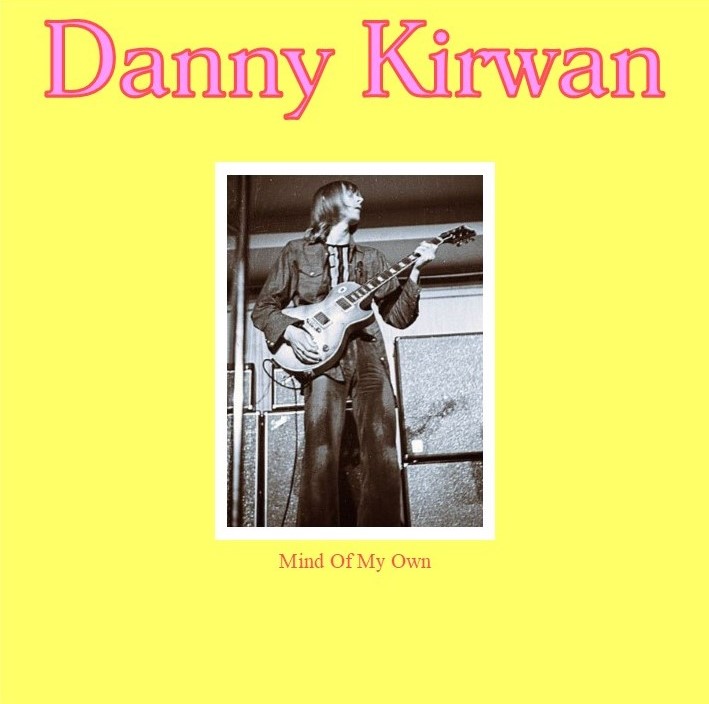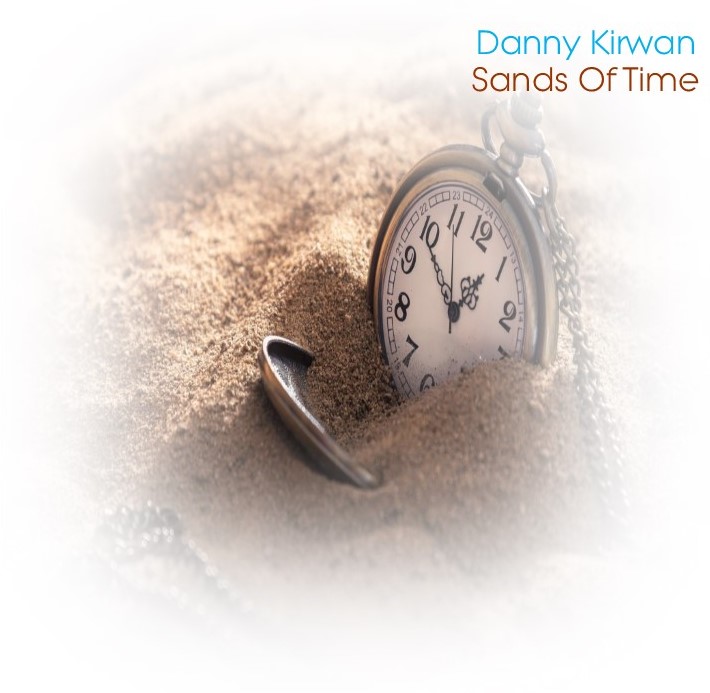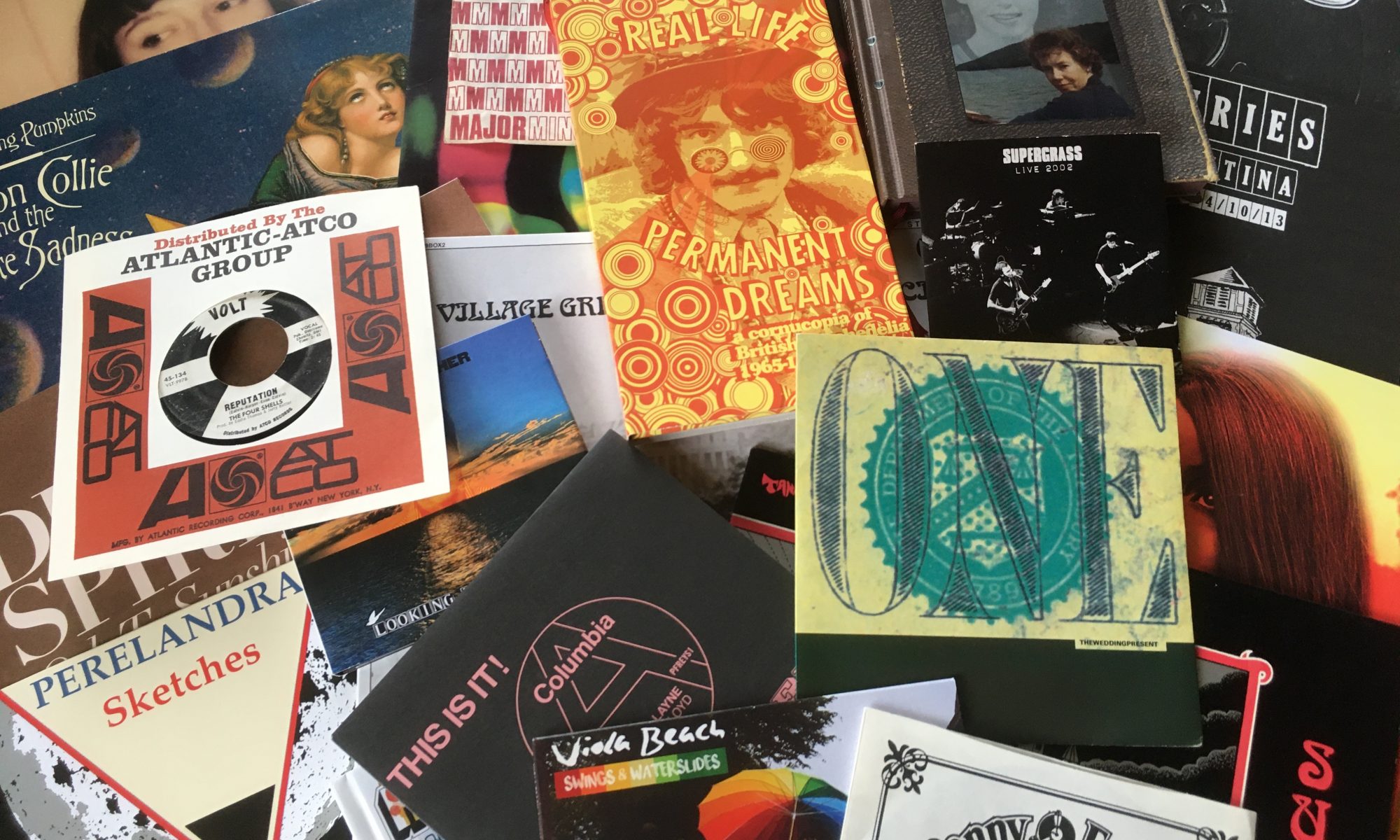Mind Of My Own (1971)

This idea for the following two what-if records came about because I was trying to put together a fourth Fleetwood Mac album from the Peter Green line up. I did have a go but this ultimately failed because looking at all of the available material, there was a lack of new material from Green and nothing new from Jeremy Spencer, which is not much of a surprise as he only just released a solo album. On the other hand, Danny Kirwan had lots of material from the Green era that did not make it onto a Mac studio album. From 1968 to 1970, he wrote enough material to fill an album. For this album to come out though, we need to do a little bit of rewriting of the band’s history.
Fleetwood Mac had spent the majority of 1970 touring America and then Europe, but all was not happy in the camp. Founder member and talismanic guitar player Peter Green was struggling with the trappings of fame and the band have noticed his behaviour has changed. He has grown a beard, started wearing a crucifix (which was odd in the fact that Green was Jewish) and had spoken about giving his money away. In March, he spent some time in a commune in Munich, Germany where he ingests some LSD that, according to the manager Clifford Davis, is where Green’s fragile mental state finally broke. Green decided to leave the band he had founded and the remaining quartet soldier on for a few gigs and record the album ‘Kiln House’ before bringing in Christine McVie, bass player John McVie’s wife and famous musician in her own right to fill out the sound. The band records the single, ’Dragonfly’ and ‘The Purple Dancer’ before the end of the year which is released in March of 1971. The song is not a hit and it is the only Kirwan pen A-Side released in his native UK.
This line up continues to tour and record radio sessions before returning the USA in February for another Stateside tour. It is here that Spencer starts to become disillusioned with life in the Mac. He is unimpressed with how he sounds on live recordings and when a major earthquake hits Los Angeles, he fails to persuade the band not to go there. When the band arrives in L.A., Spencer says that he is going to a bookshop but never returns. The band have to cancel all their L.A. shows because they are looking for their missing guitar player. When he is eventually found, Spencer has joined the religious group, the Children of God. Despite appeals from the band to fulfil his obligations to the band, Spencer will not return. The band play a few gigs as four piece before convincing Peter Green to rejoin them for a few gigs before they can recruit a permanent replacement. It is here that Bob Welch comes into the picture. The band continue to record and have a core of four members throughout this period. Welch convinces the band to move to America as they have become more successful there than their native UK. Welch leaves the band shortly after this move the band recruit Stevie Nicks and Lindsey Buckingham, becoming one of the biggest bands on the planet.
What if the band had decided that after losing two founder members that were not only front men for the group but songwriters to boot? This is where these what if albums come in and the history of Danny Kirwan could have been a bit different.
With the band returning to Britain after the end of their 1971 USA tour, Kirwan and the remainder of Fleetwood Mac decide that losing Green and Spencer is too much for the group to carry on so they disband. The rhythm section of Mick Fleetwood and John McVie are well known enough to become session musicians (which they did do in reality when they played on Warren Zevon’s song ‘Werewolves of London’). Christine McVie resurrects her solo career but like her previous attempt at fronting a band under her own name, it does not last and she retreats into studio work. What of Danny Kirwan though. Under the direction of Mac’s manager, Clifford Davis, he is left to fulfil the band’s recording contract with Reprise and promises to deliver two albums in the next two years.
Kirwan did not have a great deal of new material so he decided to resurrect some songs that he had performed with Fleetwood Mac either live or on radio show but had not made their way onto an official album. Roping in the other ex members of Fleetwood Mac for the sessions, Kirwan produces an album that is quite eclectic. I have listed next to songs where these songs can be found.
Side 1
- Like It This Way (The Vaudeville Years of Fleetwood Mac)
- Early Morning Come (Live At The BBC)
- Mind Of My Own (Show Biz Blues)
- Open The Door (Madison Blues)
- Down At The Crown (Madison Blues)
Side 2
- Tell Me From The Start (The Vaudeville Years of Fleetwood Mac)
- Love It Seems (The Vaudeville Years of Fleetwood Mac)
- Loving Kind (Live In Boston)
- Only You (Live At The BBC)
- When I See My Baby (Live At The BBC)
- Farewell (The Vaudeville Years of Fleetwood Mac)
Kirwan was rooted in blues music but he did have quite an eclectic taste. This are shown by the songs included on this record. ’Like It This Way’, ‘Early Morning Come’ and ‘Mind of My Own’ highlight Kirwan’s blues influences but this changes with ‘Open The Door’ which shows some distinctly country roots. ‘Down At The Crown’, a song about the pub located near the Fleetwood Mac’s communal house in Hampshire shows a rockier side to Kirwan.
Side two opens with ‘Tell Me From The Start’ which sounds very out of time for the late 60’s, early 70s. It harks back to an earlier age and shows an influence of swing. ‘Love It Seems’ hints at the songs Kirwan would write and contribute to the ‘Future Games’ album. ‘Loving Kind’ and ‘Only You’ reintroduce more blues to the mix before ‘When I See My Baby’, which sounds like something Jeremy Spencer would compose; a pastiche of a 50’s doo-wop band. The album finishes with Farewell would could be said to be a bit of a cheat because it was an early version of Earl Grey, that was included on the ‘Kiln House’ LP. It is different enough to stand on its own and means that the two sides of the album have similar run times.
Sands of Time (1972)

Sales of the first album are strong enough for Kirwan to go into the studio to record again. Kirwan once again uses the ex-Mac members as his backing band and this album is split between the more rock orientated songs on Side A and the more mellow songs on Side B. The album is not as successful as the previous effort so Kirwan is sent out on tour to promote it. However, this is where it all goes wrong. Kirwan has been a heavy drinker for the last couple of years and this has now turned into full blown alcoholism. He had also experimented with LSD and mescaline. This did not help Kirwan who was possible too sensitive a soul to have survived long in the music business. After cancelling the rest of the tour, Reprise do not take up the option of renewing Kirwan’s contract. Kirwan spends the next couple of years playing on songs of old acquaintances and trying to get a new band together. He would eventually release his next solo album in 1975 called ‘Second Chapter’.
Side A
- Child Of Mine (Bare Trees)
- Bare Trees (Bare Trees)
- Danny’s Chant (Bare Trees)
- Trinity (25 Years – The Chain)
- Sunny Side Of Heaven (Bare Trees)
Side B
- Woman Of 1000 Years (Future Games)
- Sands Of Time (Future Games)
- Sometimes (Future Games)
- Dust (Bare Trees)
I initially did not intend to do a second part to the Danny Kirwan what ifs album, but whilst putting together the first one, I thought about all of the material that was written by him between 1971 and 1972 that had originally been released by Fleetwood Mac in what is know as their wilderness years. There was also a song released on the 25th Anniversary Box Set that meant that even though there are less songs on this LP, this album is actually longer. Both of these albums hold together quite well, even though the second is a lot more consistent seeing as the majority of those songs were officially released by the band at the time. The first album is essentially a load of outtakes.
In the real world, Fleetwood Mac continued on after Jeremy Spencer left, recruiting American Bob Welch. With Spencer gone, so were the 50’s pastiches and Elmore James blues work outs. This line-ups first album was ‘Future Games’ which was more acoustic and melodic than previous efforts, with only the filler jam of ‘What A Shame’ spoiling what could be considered a lost classic. After the release of ‘Future Games’, the band began an eleven month tour of the US and Europe. ‘Future Games’ had sold well in America and Fleetwood Mac broke house attendance records at some of the venues they played in. They even had time to record another album in the shape of ‘Bare trees’. Not all was well with Kirwan though.
His fragile mental state, his drinking and being worn down by the constant touring, Kirwan fell apart. Backstage at a University gig on the ‘Bare Trees’ promotional tour, Kirwan started to argue with Welch over his guitar being in tune. He then proceeded to smash his head against and wall and then destroy his guitar. Refusing to go on stage, Kirwan sat by the mixing desk and then criticised the band for not putting on a good enough show. Kirwan was promptly fired from the band. He played with a few bands and released three solo albums, and even though the first two do have some merit, by the third, his fire was gone. The album was only recorded to fulfil his record contract and Kirwan’s distinct lead playing is nowhere to be seen. It has been debated if he even played any guitar on the record at all.
Kirwan would spend some time homeless in the 80’s and 90’s, and even though he was able to find accommodation in the care home for alcoholics, he never recorded again. A shame, as this guy did write some good tunes (even if he did borrow some of his lyrics from poets) and was a talented player.
Both of the album covers are inspired by the ones Fleetwood Mac used in the same time period.
I have not been able to put together a Spotify playlist for either of these what ifs due to that platform not having all of the material available on it.

One Reply to “Danny Kirwan – Mind Of My Own/Sands Of Time”